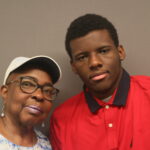Description
Eleanor Henry (68) talks to her son Solomon Henry (20) about growing up in Jamaica, living in New York, and her experience with cultural diversity.Subject Log / Time Code
Solomon (S) talks about his life as a child growing up in Harlem, and how he’s changed as a young adult.
S discusses his friends and what home means to him.
Eleanor (E) remembers her childhood in Jamaica and her move to the US. She says she became more responsible as she got older. She also talks about liking to travel.
E says her father influenced her views on other cultures through food.
E shares the traditions she carries on, including making sorrel for Christmas.
S asks E about building connections with their neighbors.
E considers how she honors people’s differences, and talks about her experience of diversity in Jamaica and in the US.
E shares her hopes for future generations, including that they learn the importance of personal finance.
Participants
- Eleanor Henry
- Solomon Henry


